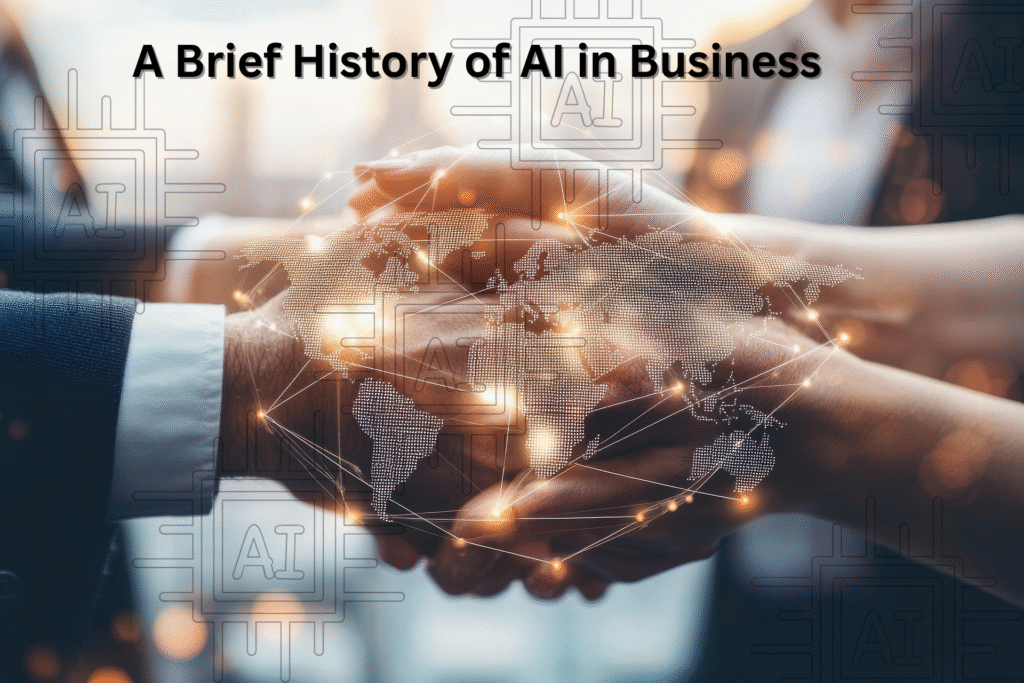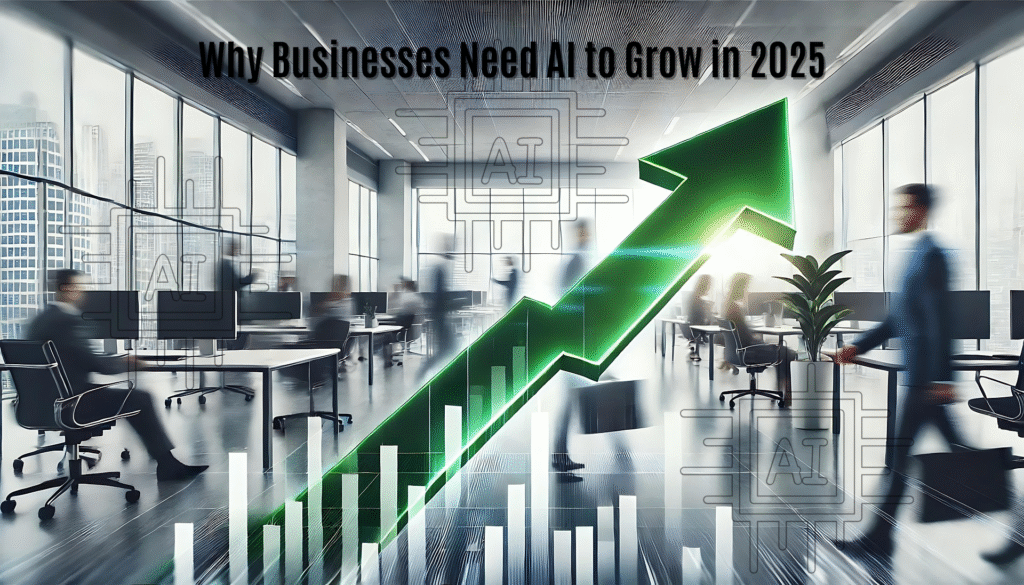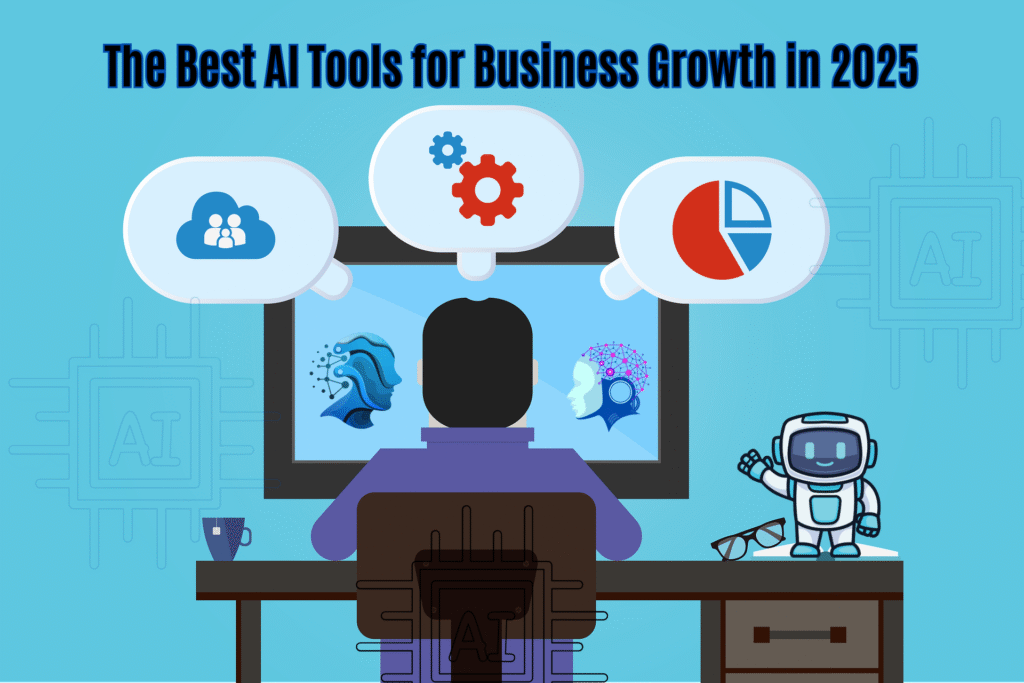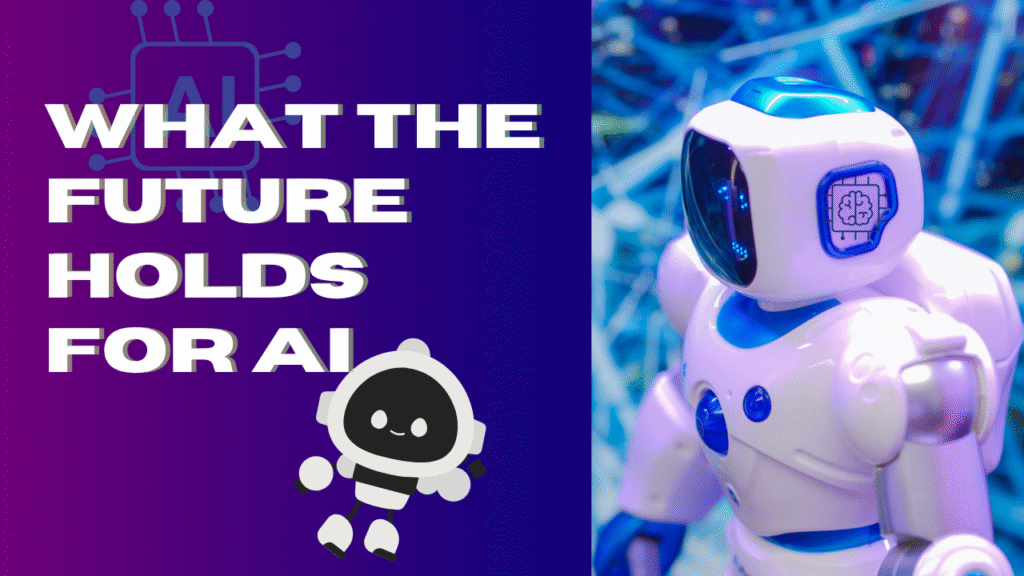Welcome to another powerful edition of our daily blog, where we delve into the cutting-edge innovations transforming industries worldwide. Today, we’re zeroing in on a topic that’s reshaping the foundation of modern business: the Best AI Tools for Business Growth in 2025.
Here are some of our popular post: Top 10 best website builders, Best super foods for a healthy lifestyle, the unlimited list of free productivity apps, Best freelance site to find remote jobs, top 10 productivity hacks for entrepreneurs, 10 best side hustles to make extra money online, best online courses for learning digital skills, top 10 best free coding website
Artificial Intelligence (AI) is no longer a buzzword reserved for tech enthusiasts; it has become a reality. It has become a cornerstone of digital transformation, influencing how companies of all sizes operate, compete, and succeed. From automating customer service to generating personalized marketing content, AI is proving to be one of the most valuable assets for forward-thinking organizations.
While concerns exist about job displacement, the truth is that businesses that adapt and harness AI will experience exponential growth. Those who delay risk being overtaken by competitors who are already maximizing the power of intelligent automation. To keep you ahead of the curve, we’ve conducted deep research into the Best AI Tools for Business Growth in 2025. Read on to discover how these tools can revolutionize your operations and supercharge your bottom line.
What is AI?

Artificial Intelligence refers to the simulation of human cognitive processes by machines and computer systems. It involves the development of algorithms that allow software and hardware systems to perform tasks typically requiring human intelligence, such as problem-solving, language understanding, learning, and decision-making.
In the business landscape, AI is primarily deployed in a narrow form, designed to perform specific functions exceptionally well. These include tasks like customer segmentation, fraud detection, chat automation, and predictive analytics. AI systems operate by analyzing large datasets at scale, detecting patterns, and drawing actionable conclusions faster than any human team could achieve manually.
In 2025, AI encompasses several subfields, including machine learning (ML), deep learning, natural language processing (NLP), and robotic process automation (RPA). Each of these branches contributes to the growing suite of AI tools for business growth, empowering companies to optimize efficiency, reduce costs, and enhance decision-making accuracy.
A Brief History of AI in Business

The origins of AI in business date back to the 1950s when researchers first explored computational logic and intelligent systems. However, practical applications didn’t emerge until the 1990s, when businesses began using AI-powered algorithms to aid in financial forecasting, logistics planning, and customer relationship management.
By the 2010s, the explosion of big data and cloud computing led to the rise of machine learning-based tools, making AI more accessible and scalable. Tools like chatbots, virtual assistants, and recommendation engines became mainstream, and companies across industries—from healthcare to retail—began to integrate AI into their operations.
Fast forward to 2025, and we are now witnessing an era where AI is not an add-on but a strategic necessity. Organizations are using the best AI tools for business growth to automate workflows, personalize customer journeys, improve risk management, and even develop new products. AI is now deeply embedded in business strategies, reshaping the future of work and redefining what it means to be efficient and competitive.
Why Businesses Need AI to Grow in 2025

AI is the fuel driving modern businesses. Companies that implement AI systems report significant improvements in decision-making, customer satisfaction, and operational speed. For instance, AI can sift through millions of data points to reveal customer preferences, predict purchase patterns, and recommend marketing strategies that convert.
Moreover, AI helps businesses reduce costs by eliminating redundancies and optimizing performance across departments. Whether it’s reducing the manual workload in HR through automated recruitment platforms or enhancing cybersecurity protocols using anomaly detection AI, these tools provide businesses with a high ROI. Embracing AI is no longer optional—it’s the key to sustainable, scalable growth in the digital age.
Here are some of the advantages of the best AI tools for business growth, each showcasing how Artificial Intelligence contributes to increased efficiency, scalability, and profitability:
#1. Automation of Repetitive Tasks: AI automates time-consuming, repetitive processes such as data entry, email sorting, inventory updates, and even basic customer service interactions. This allows employees to focus on higher-value work like strategy, innovation, or customer relationship building. Automation improves speed and accuracy while drastically reducing human error and operational bottlenecks.
#2. Data-Driven Decision Making: One of the most powerful benefits of AI is its ability to analyze vast amounts of data quickly and accurately. Through machine learning algorithms, businesses can uncover insights from sales trends, customer behaviors, market shifts, and competitor strategies. These insights enable more informed and timely decisions, helping companies minimize risk and seize opportunities faster than their competitors.
#3. Enhanced Customer Experience: AI helps businesses offer highly personalized customer experiences. Tools like chatbots, recommendation engines, and virtual assistants use customer data to tailor product suggestions, send personalized emails, and provide instant responses to inquiries. This level of customization increases customer satisfaction, loyalty, and retention, critical factors in long-term growth.
#4. Cost Efficiency and Resource Optimization: By automating tasks, reducing the need for large manual teams, and optimizing operational processes, AI significantly lowers business costs. For example, AI can reduce the need for full-time customer service reps by handling basic queries through chatbots or streamlining supply chain management to minimize waste and excess inventory. Over time, these efficiencies result in major cost savings.
#5. Predictive Analytics and Forecasting: AI systems can forecast future trends based on historical and real-time data. Whether predicting customer churn, sales volume, seasonal demand, or maintenance needs, predictive analytics helps businesses proactively respond to change. This foresight improves strategic planning and ensures businesses stay ahead of market shifts instead of reacting to them too late.
#6. Improved Marketing and Sales Strategies: AI helps marketers and sales teams understand customer preferences, behavior patterns, and content engagement. AI tools can segment audiences, test ad creatives automatically (A/B testing), and optimize digital marketing campaigns in real-time. In sales, AI-driven CRMs recommend which leads to prioritizing, improving conversion rates, and shortening the sales cycle.
#7. Enhanced Cybersecurity and Risk Management: AI plays a crucial role in identifying and neutralizing security threats. It monitors network activity, detects anomalies, and reacts to potential threats before they escalate. In industries like finance or e-commerce, where fraud is a major concern, AI helps businesses maintain security by analyzing patterns that might indicate data breaches or suspicious transactions.
#8. Smarter Hiring and Human Resource Management: AI tools can streamline the recruitment process by scanning resumes, identifying top candidates, and conducting preliminary interviews using chatbots. In HR, AI can analyze employee satisfaction, monitor performance, and even recommend personalized training programs. This ensures businesses hire the right talent and nurture a more productive and engaged workforce.
#9. Scalability Without Proportional Costs: With AI, businesses can scale operations without the need to hire or train large numbers of employees. For example, a single AI chatbot can handle thousands of customer queries daily, and AI-driven analytics tools can manage large datasets from multiple markets. This scalability allows businesses to grow rapidly while keeping costs and infrastructure lean.
#10. Competitive Advantage: Companies that adopt AI early gain a significant competitive edge. They can innovate faster, respond to customer needs more efficiently, reduce operational lag, and offer better services. In a market where speed, personalization, and data intelligence matter, AI ensures that businesses don’t just keep up—they lead.
The Best AI Tools for Business Growth in 2025

Several advanced tools are dominating the AI landscape this year. Each of these platforms has been designed to address specific business challenges—from content creation and CRM to analytics and customer service. Let’s explore the Best AI Tools for Business Growth in 2025 and how they can be integrated into your business strategy.
#1. ChatGPT (Business Edition) continues to lead in AI-driven content generation and customer engagement. Businesses are leveraging this tool to craft blog articles, automate email responses, develop chatbots, and even brainstorm marketing campaigns. Its versatility makes it a powerhouse for productivity.
#2. Salesforce Einstein brings AI into CRM, making customer interactions smarter. It assists sales teams with lead scoring, opportunity predictions, and intelligent recommendations, enabling companies to close deals faster and nurture relationships more effectively.
#3. HubSpot AI has revolutionized inbound marketing by automating lead nurturing, email marketing, and customer segmentation. With its AI integrations, businesses can now personalize their marketing strategies at scale, boosting conversions and long-term engagement.
#4. Jasper AI stands out in content marketing. It empowers teams to produce high-quality ad copy, blogs, and social media content in seconds. This tool has become a favorite among marketers who want to maintain consistent brand messaging without overloading their creative departments.
#5. Zapier AI helps streamline internal workflows by automating repetitive tasks across different platforms. For businesses juggling multiple apps and tools, Zapier ensures seamless integration and intelligent task execution, saving both time and money.
#6. Grammarly AI enhances business communication by providing real-time grammar, tone, and clarity suggestions. It’s especially valuable for teams creating customer-facing content, ensuring professional and impactful writing across the board.
#7. Google Analytics 5.0, now infused with AI capabilities, offers advanced insights into customer behavior, traffic trends, and campaign performance. Businesses can now make data-driven decisions with greater precision and speed.
#8. Xero AI simplifies accounting by automating invoicing, reconciling transactions, and forecasting financial performance. It is particularly helpful for SMEs seeking to maintain financial health without hiring full-scale accounting teams.
#9. Zendesk AI enhances customer support by routing tickets intelligently, offering instant responses, and analyzing customer sentiment. It enables support teams to resolve issues faster and improve satisfaction scores.
#10. Tableau AI combines business intelligence with artificial intelligence to provide dynamic data visualization. It empowers leaders to make strategic decisions based on real-time insights and trend forecasting.
The Future of AI and Business

The evolution of AI is accelerating, and with it comes a new era of business capabilities. As we move deeper into 2025, the most successful companies will be those that fully embrace and integrate the Best AI Tools for Business Growth into their operations. AI is no longer about experimentation—it’s about execution.
The competitive advantage offered by AI is undeniable. From startups to enterprise-level corporations, organizations leveraging AI will innovate faster, serve customers better, and scale with less friction. The businesses that invest in training their teams, refining their AI strategies, and choosing the right tools will lead their industries in performance and profitability.
Conclusion: Best AI Tools for Business Growth
As we navigate the complexities of AI and how it affects modern businesses, one truth becomes increasingly clear: the future belongs to businesses that adapt, automate, and evolve. The Best AI Tools for Business Growth are not just enhancing processes—they’re redefining what’s possible in business.
Here are some of our popular post: Top 10 best website builders, Best super foods for a healthy lifestyle, the unlimited list of free productivity apps, Best freelance site to find remote jobs, top 10 productivity hacks for entrepreneurs, 10 best side hustles to make extra money online, best online courses for learning digital skills, top 10 best free coding website
Whether you’re looking to streamline your marketing, improve customer service, or gain better insights into your business performance, AI tools provide a reliable path forward. By embracing these technologies now, you’re not just keeping up with the competition—you’re setting the pace.
Are you ready to transform your business in 2025 and beyond? Start exploring the best AI tools available today, and position your brand and business at the forefront of innovation.


